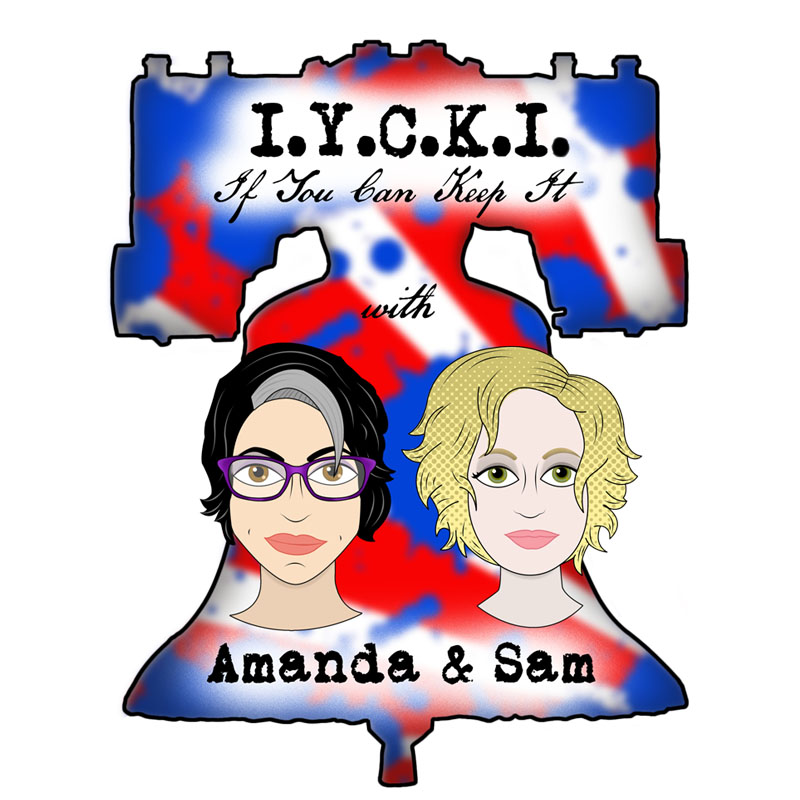(Episode 33) Be Still and Know That I Am the Logic: The 14th Amendment, Part 1 of 3
Welcome to Season 4, Episode 4, Listeners! We're kicking off the first of three installments dealing with the 14th Amendment. Although it has five sections, the first section is the one that really packs a punch in terms of concepts and case law. So the first two installments of the 14th Amendment address Section 1, and then installment 3 will take on the remaining clauses.
The 14th Amendment was passed just after the Civil War, along with the 13th and 15th Amendments, during the "Reconstruction Era" in the United States. Post-war America was grappling with racism, particularly in the South. These three Amendments were passed to address the treatment of African Americans and freed slaves, which was wildly inconsistent from state to state. Congress tried addressing it with the Civil Rights Act of 1866, but ultimately, the 14th Amendment was necessary. But the 14th Amendment doesn't specifically address race - it's broader than that.
Let's start with the parts in bold, shall we?
Section 1: "All persons born or naturalized in the United States, and subject to the jurisdiction thereof, are citizens of the United States and of the State wherein they reside. No State shall make or enforce any law which shall abridge the privileges or immunities of citizens of the United States; nor shall any State deprive any person of life, liberty, or property without due process of law; nor deny to any person within its jurisdiction the equal protection of the laws."
The first bold section is known as the Citizenship Clause. It's pretty straightforward in the modern day. If you're born here, you have birthright citizenship. You might've heard something about this in the news when the President talked about wanting to sign an executive order ending birthright citizenship (don't worry - that didn't, and probably can't, happen). And if you're not born here, you can still be naturalized and become a citizen - as long as, in either case, you're still subject to the jurisdiction of the US (which includes federal territories).
Being a citizen has its perks. And what's amazing about our country is that you can become an American no matter where you're born. (As one of Sam's mentors used to explain, you can be "Born American, but in the wrong place.")
The second bold section is known as the Equal Protection Clause. This is one of the most litigated areas of law to this day. The clause that provides the foothold for Brown v. Board of Education to overturn Plessy v. Ferguson's holding that you can have segregated public accommodations be "separate but equal" (you can't). It's also where the courts have grappled with affirmative action, interracial marriage and other marriage rights, the right to privacy (which is where abortion rights fall). Kind of a big deal, right?
Additional Sources:
America's Equal Citizenship Clause, by Akhil Reed Amar
The Washington Post's Take on Trump and Birthright Citizenship
The 14th Amendment was passed just after the Civil War, along with the 13th and 15th Amendments, during the "Reconstruction Era" in the United States. Post-war America was grappling with racism, particularly in the South. These three Amendments were passed to address the treatment of African Americans and freed slaves, which was wildly inconsistent from state to state. Congress tried addressing it with the Civil Rights Act of 1866, but ultimately, the 14th Amendment was necessary. But the 14th Amendment doesn't specifically address race - it's broader than that.
Let's start with the parts in bold, shall we?
Section 1: "All persons born or naturalized in the United States, and subject to the jurisdiction thereof, are citizens of the United States and of the State wherein they reside. No State shall make or enforce any law which shall abridge the privileges or immunities of citizens of the United States; nor shall any State deprive any person of life, liberty, or property without due process of law; nor deny to any person within its jurisdiction the equal protection of the laws."
The first bold section is known as the Citizenship Clause. It's pretty straightforward in the modern day. If you're born here, you have birthright citizenship. You might've heard something about this in the news when the President talked about wanting to sign an executive order ending birthright citizenship (don't worry - that didn't, and probably can't, happen). And if you're not born here, you can still be naturalized and become a citizen - as long as, in either case, you're still subject to the jurisdiction of the US (which includes federal territories).
Being a citizen has its perks. And what's amazing about our country is that you can become an American no matter where you're born. (As one of Sam's mentors used to explain, you can be "Born American, but in the wrong place.")
The second bold section is known as the Equal Protection Clause. This is one of the most litigated areas of law to this day. The clause that provides the foothold for Brown v. Board of Education to overturn Plessy v. Ferguson's holding that you can have segregated public accommodations be "separate but equal" (you can't). It's also where the courts have grappled with affirmative action, interracial marriage and other marriage rights, the right to privacy (which is where abortion rights fall). Kind of a big deal, right?
Additional Sources:
America's Equal Citizenship Clause, by Akhil Reed Amar
The Washington Post's Take on Trump and Birthright Citizenship

Comments
Post a Comment